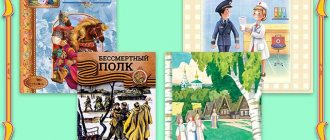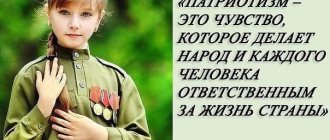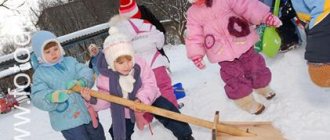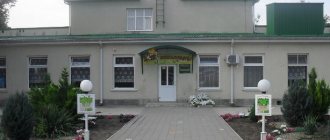Civic-patriotic education of preschool children
"Only those who love, appreciate and respect
accumulated and stored by the previous
generation, can love the Motherland,
get to know it, become a true patriot.”
S. Mikhalkov.
In the modern world, when big changes occur in the life of society, patriotic education becomes one of the main areas of work in preschool education. There is an increasing need to turn to folk traditions, culture, history, to centuries-old roots, to the concepts of kinship and homeland.
The state program “Patriotic Education of Citizens of the Russian Federation” gives the following definition of patriotic education: this is the systematic and purposeful activity of government bodies and organizations to develop in citizens a high patriotic consciousness, a sense of loyalty to their fatherland, readiness to fulfill civic duty and constitutional duties to protect the interests of the Motherland .
Patriotic education is the process of mastering the heritage of traditional national culture, forming an attitude towards the country and state where a person lives.
The feeling of patriotism includes not only love and devotion to the Motherland, responsibility and pride for it, but the desire and desire to work for its benefit, to protect and increase its wealth. Without respect for the history and culture of one’s Fatherland, for its state symbols, it is impossible to instill in a child a sense of self-esteem, self-confidence and a full-fledged personality.
Preschool age, as a period of personality development, has its own potential for the formation of higher moral feelings, which include a sense of patriotism.
In recent years, attention to the spiritual richness of the cultural heritage of the people has increased. This should be seen as the desire of peoples for national revival. There is not a single nation that does not strive to preserve its national identity, manifested in its native language, folklore, traditions, and art. Today, the leading principle of education should be considered education carried out on the roots of national tradition. Raising a holistic personality requires the use of interrelated means and various forms of influence.
In the works of B.G. Belinsky, K.D. Ushinsky, V.A. Sukhomlinsky patriotic education was the central idea. A great contribution to the scientific substantiation of this problem was made by B.T. Likhachev, N.V. Vinogradova, E. I Radina and others. Modern researchers such as T. T. Zubova, E. P. Arnautova, A. S. Kozlova, S. E. Shukshina, O. A. Artamonova, M. V. Krulekht and others also pay great attention to patriotism. Especially research in the field of content of preschool education and upbringing, aimed at studying the mechanisms of socialization, the formation of a child’s social competence, his awareness of himself as a representative of human civilization, as well as children’s perception of the objects of the world around them, the formation of their ideas about the work activities of adults, etc. d.
Bashkir teacher-researchers Agisheva R.L., Atnabaeva F.G., Narynbaeva A.Z., Amineva R.I., Nafikova Z.G., Galieva G.G. Methodological manuals and programs for studying the native land have been developed.
At the scientific and methodological level, the relevance lies in the need to expand the content of work with families. Regulatory documents and programs of preschool institutions reflect the need for active interaction with families, but the content and forms of work with families in order to cultivate feelings of patriotism are not sufficiently developed.
The contradictions that have arisen at the present time are of particular relevance in the formation of the foundations of patriotism among preschoolers:
— priority of material interests and pragmatic values over spiritual and moral ones;
- a sharp decrease in the educational influence of the family in the field of education.
Indifference and disdain for civic duty and service to the Motherland have become widespread in the public consciousness.
The main contradiction is the contradiction between the need to master certain knowledge, skills and abilities in the process of preschool preparation and the fragmentation, isolation from life of knowledge, skills and abilities acquired in the traditional way.
It is necessary to create a space that will help adults and children interact in the transmission by some and the acceptance by others of the cultural values of the past and present, knowledge and preservation of them in the present and future.
In preschool age, the basic qualities of a person are formed. Therefore, it is important not to miss the opportunity to fill the child’s soul with sublime human values and to arouse interest in the history of their homeland.
In the process of moral, labor and mental development of the child, the first shoots of civic-patriotic education arise.
Based on the above, civic-patriotic education is understood as the process of becoming a conscious person who loves and values his land, his native land, knows and respects the cultural values and history of his people.
The task of educating a citizen and patriot who knows and loves his homeland, which is especially urgent today, cannot be successfully solved without a deep knowledge of the spiritual wealth of his people and the development of folk culture. The inclusion of a national-regional component in the patriotic education of a preschooler is determined by modern conditions: the deepening socio-cultural crisis, the contradiction between increased national self-awareness and the established practice of education exclusively on universal values.
On September 1, 2013, the new law “On Education in the Russian Federation” came into force, in which for the first time preschool education is enshrined as a level of general education. On January 1, 2014, the Federal State Educational Standard (FSES) came into force.
The main goal of the educational field “Social and communicative development” is the positive socialization of preschool children, introducing children to sociocultural norms, traditions of the family, society and state.
One of the main directions of implementation of the educational field “Social and communicative development” is the patriotic education of preschool children.
Based on this, patriotic education of preschool children includes the following components:
- nurturing the child’s attitude towards himself as a full-fledged person;
— respect for your family as the bearer of family tradition and native language;
— formation of spiritual and moral relations;
- formation of love for the native land (involvement in one’s home, family, kindergarten, city);
— formation of love for the cultural heritage of one’s people;
- a tolerant attitude towards representatives of other nationalities, peers, parents, neighbors, and other people.
In connection with the pressing issue of patriotic education of the younger generation in a changing world, there is a need to turn to the native origins, to the roots, namely the traditions and culture of the people, their history, such concepts as “Motherland”, “native land”, “beloved city” ", to encourage love for the Fatherland, a sense of pride in one’s Motherland.
Currently, the problem of civic and patriotic education of preschool children is increasingly being discussed. When modernizing education, educational models are being built, noting the need to carry them out taking into account national-regional experience and local conditions.
One of the targets in the Law of the Russian Federation “On Education” is aimed at protecting national cultures and regional cultural traditions.
Within the framework of this article, we want to show the work of MADOU kindergarten No. 198 in Ufa in instilling in children a love for their native land and a sense of patriotism.
In the kindergarten there is a group in which educational activities are conducted in the Tatar language. In it, teachers, through games, organized educational activities, conversations, reading fairy tales, stories, strive to arouse the child’s interest in their native land. In the group, the subject-developmental environment is organized in such a way that every child can get acquainted with the traditions and culture of the Tatar people in a playful way. Some household items, national costumes, and musical instruments are presented in an accessible form for the development of the cognitive interests of preschool children. Demonstration material is presented in the form of albums, pictures, photographs, laptops. In the corner of artistic and aesthetic development there are paintings and works of art by Tatar authors, which are also used in work on civic-patriotic education. Children really enjoy being in the group, they enjoy listening to the stories of teachers, looking at them, asking questions, talking about the traditions of their families, stories they heard from their grandparents.
At the MADOU kindergarten No. 198 in Ufa, teachers prepared a long-term project (from October to May) on the civic and patriotic education of preschoolers using a regional component called “Bashkortostan is my native land.”
The participants in the project were children of senior preschool age, teachers and parents.
Goals and objectives were identified aimed at a deeper study of the nature of the native land, resorts, reserves of the republic, and memorable places in the cities of Bashkortostan. The teachers developed a long-term plan according to which the material was selected with the help of parents. Together with the parents, an excursion to the local history museum and trips to memorable places in the city of Ufa were organized.
The product of this work was the organization of the Sabantuy holiday. It was held on the territory of the institution; both teachers and parents of preschool children took an active part in the design and conduct of the holiday.
None of the programs makes it possible to fully solve the problem of introducing children to their native land. Teachers have to independently collect and systematize the material. In our work, we use teaching aids and recommendations from K.V. Zakirova, G.R. Gilyazetdinova, R.L. Agisheva, R.K. Shaekhova.
The “Shezhere” holiday is held within the walls of our kindergarten. Preschoolers, starting from a young age, participate in this event, together with their parents they prepare a family tree, a presentation: they tell the history of the family, what traditions they have, what holidays are celebrated, and show a musical number. Parents actively support the idea of holding such holidays and participate in them with pleasure. Such events not only have a beneficial effect on the interaction between the preschool institution and the family, but also improve relationships in the family and cultivate moral qualities in children, which develop into a sense of patriotism. It begins in a child with his relationship to his family, to the closest people - mother, father, grandmother, grandfather. These are the roots that connect him with his home and immediate environment, as well as with admiration for what the baby sees in front of him, what he is amazed at and what evokes a response in his soul.
V.A. Sukhomlinsky argued that “childhood is an everyday discovery of the world and, therefore, it must be done so that it becomes, first of all, the knowledge of man and the Fatherland, their beauty and greatness.”
Moral qualities do not arise naturally. Their formation occurs as a result of emotional accumulation and awareness of certain personal phenomena and depends on the means and methods of education, on the conditions in which the child lives.
List of used literature.
- Agarkova, E.I. Development of regional programs for the development of the preschool education system [text] / E.I. Agarkova, S.V. Zagrebelnaya, I.V. Klemoinova, A.P. Samorodov, G.A. Shesherin, under the general editorship. N.G. Astafieva, methodological recommendations. –M.: Arkti, 2010.-72 p.
- Agisheva, R.L. I get to know Bashkortostan [text] / R.L. Agisheva, educational and methodological manual for teachers of preschool educational institutions and primary school teachers. – Ufa.: BIRO, 2009.-100 p.
- Zelenova, N.G. We live in Russia [text] / N.G. Zelenova, L.E. Osipova, textbook. -M.: Academy, 2007. -82 s
- Kozlova, S.A. Preschool pedagogy [text] / S.A. Kozlova, T.A. Kulikova, textbook for students. Avg. Prof. Textbook institutions.-M.: Publishing House, 2009.
- Novitskaya, M.Yu. Heritage. Patriotic education in kindergarten [text] / M.Yu. Novitskaya, textbook. -M.: Linka-Press, 2012.
- Decree of the Government of the Russian Federation of October 5, 2010 No. 795 “On the state program “Patriotic education of citizens of the Russian Federation for 2011 - 2015” [Electronic resource]. – Access mode http: //www.garant.ru/ (01/15/2015).
- Order of the Ministry of Education and Science of the Russian Federation (Ministry of Education and Science of Russia) dated October 17, 2013 No. 1155 Moscow “On approval of the federal state educational standard for preschool education.”
MAGAZINE Preschooler.RF
“Organization, forms and methods of work on patriotic education in preschool educational institutions”Compiled by: Music director of the first qualification category Burkova Ekaterina Vyacheslavovna Reutov, 2022 Department of Education of the Administration of the city of Reutov Municipal autonomous preschool educational institution “Kindergarten of a combined type No. 17 “Crane”
“Today we will talk about a problem that has been long overdue and is often heard, but I probably don’t remember it being discussed so systematically: the issue of patriotic education of youth. In fact, this is a conversation about the most important thing: about values, about the moral foundations on which we can and should build our lives, raise children, develop society, and ultimately strengthen our country.” .
V.V. Putin
Over the past five years, our kindergarten (MADOU d/s No. 17) has been doing a lot of work on the patriotic education of preschoolers. Patriotic education of children is one of the main tasks of a preschool educational institution.
Goal: education of a humane, spiritual and moral personality, worthy future citizens of Russia, patriots of their Fatherland
Tasks:
- education of patriotism
- getting to know the history of your country and your people
- introducing children to the most significant events of the Great Patriotic War
- developing a sense of responsibility and pride for the achievements of one’s country
- fostering a respectful attitude towards defenders of the Fatherland, state traditions, and public holidays
- developing in children such character traits that will help him become a person and a citizen
- acquaintance with the symbols of the Russian state, its meaning
- the formation of tolerance, a sense of respect for other peoples and their traditions
In our kindergarten, since 2013, very active work has been carried out on the patriotic education of preschoolers. Monthly planning of all activities of preschool educational institutions (including planning and development of a work program for the activities of all narrow specialists) is carried out within the framework of the patriotic direction.
Forms and methods of organizing work.
The program of patriotic education in preschool institutions implies, first of all, the organization of internal methodological work in this direction. Since if the teacher himself does not experience a feeling of love for the fatherland, then he will not be able to convey it to the children, the teacher also needs to know how to most effectively convey the ideas of patriotism to preschoolers. Methodological work on patriotic education in preschool educational institutions is aimed at increasing the qualification level of educators and their pedagogical literacy. For this purpose, thematic teacher councils, consultations, and mutual visits to classes are held.
Patriotic education of preschoolers according to the Federal State Educational Standard defines such methods of working with preschoolers as: arrangement of patriotic corners in preschool educational institutions; organizing excursions, visiting museums and exhibitions; organization of thematic events (holidays, matinees, competitions, competitions, quizzes); conducting thematic discussions on patriotic themes.
Every year, the preschool educational institution draws up a plan for patriotic education, which covers all forms and methods of educational work. An approximate list of events and lesson topics provided for by the plan includes: events dedicated to state and national holidays, sports competitions, thematic classes on the study of nature, features, traditions of the native land, and state symbols.
On the basis of our preschool educational institution, 2 large projects were developed and implemented within the framework of patriotic education: “Museums for Children” and “Raising Patriots Together” . “Raising Patriots Together” project is a participant in RIP-2016 at the municipal level and a participant in the “Our Moscow Region” . These two projects are interconnected and complement each other.
Project “Museums for Children” .
We began work on this project by visiting a number of Moscow museums dedicated to music. First we visited such museums as: All-Russian Music Museum named after., Museum of Russian Harmonica A. Mirek, Central Theater Museum named after. Bakhrushin. Then we moved on to the general theme of art and visited the State Tretyakov Gallery in Lavrushinsky Lane, the All-Russian Museum of Decorative and Applied Arts, and the K. Vasiliev Museum of Slavic Culture. Next was a block of military museums dedicated to the 70th anniversary of Victory in the Second World War: the Moscow Defense Museum, the Museum of the History of the Navy (with a visit to a real submarine, which is moored on the Moscow Canal in the Khimki Reservoir); The Museum of Military Equipment of V. Zadorozhny, the Museum of Contemporary History of Russia, and finally, the Memorial Museum of Cosmonautics.
All the museums we visited are age-appropriate for preschoolers 4+. All excursion programs are accessible and, as a rule, always interactive.
Project “Raising Patriots Together” .
As part of this project, in addition to the main program matinees and holidays, we hold thematic events within the framework of the Federal Law of March 13, 1995 N 32-FZ “On the Days of Military Glory and Memorable Dates of Russia” .
- traditionally matinees dedicated to Victory Day
- laying flowers at the Tomb of the Unknown Soldier in the Alexander Garden, timed to coincide with Victory Day and the Day of the Unknown Soldier in Russia (December 3)
- open event dedicated to the 75th anniversary of the start of the counteroffensive of Soviet troops against Nazi troops in the Battle of Moscow in 1941.
- memorial evening “War. Blockade. Leningrad." dedicated to the 75th anniversary of the breaking of the siege of Leningrad
- lesson of courage (meeting with a veteran of the siege of Leningrad)
- photo exhibition “Heroes of Russia”
- quiz “Russia is my Motherland!”
- Reading competition “Poems about Russia”
- open event dedicated to National Unity Day
- open event dedicated to Border Guard Day
- holiday
- action "Immortal Regiment" , "Forest of Victory"
- action to collect humanitarian aid for residents of Novorossiya (Lugansk and Donetsk Republics)
- festive event “Day of the State Flag of the Russian Federation”
- open event “My dear capital – My Golden Moscow” for the 870th anniversary of Moscow
And yet, we carried out a number of socially oriented and socially significant actions and events aimed at interacting with society, as part of the patriotic work of our preschool educational institution.
So, as I said earlier, throughout the entire school year, planned events and actions are taking place to create a holistic system of patriotic education for preschoolers. I would like to dwell on some of them separately.
Patriotic feeling does not arise on its own. This is the result of long-term, targeted educational influence on a person, starting from a very early age. By introducing children to their hometown, its historical and cultural features, the history of our country and people, we form in children such character traits that help them become patriots and citizens of their Motherland. After all, the most vivid impressions received in childhood remain in memory for a lifetime.
| Next > |




